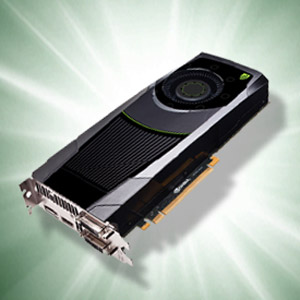 NEWS
NEWS
 NEWS
NEWS
 NEWS
NEWS
![]() The cloud has penetrated everything, even gaming, and Nvidia wants to craft the sails that will lead the gaming world into those cloudy waters with their upcoming Kepler-based graphics chips—these graphics cards will include features designed to enable cloud-gaming across the Internet and facilitate lower-lag with shinier graphics for the next generation of consoles.
The cloud has penetrated everything, even gaming, and Nvidia wants to craft the sails that will lead the gaming world into those cloudy waters with their upcoming Kepler-based graphics chips—these graphics cards will include features designed to enable cloud-gaming across the Internet and facilitate lower-lag with shinier graphics for the next generation of consoles.
Essentially, the way Nvidia and others see it: home consoles can only go so far in power and strength requirements for graphics and this means a cost-barrier to customers. So gaming-as-a-service breaks in by allowing data centers to house extremely powerful graphics cards on servers that run the games, render the graphics, and then stream them to the consoles. Lowering the power and cost needs at the client end and defraying costs for the enterprise.
Dean Takahashi from GamesBeat interviewed Nvidia senior vice president Dan Vivoli about Nvidia’s announcement of the Kepler-based cloud-gaming chipsets and how they might impact the industry as a whole,
But with improved multitasking on Nvidia’s Kepler-based graphics chips, each data center server can handle multiple users at a lower cost. That makes cloud gaming more economical, Vivoli said.
The Kepler-based chips have also been designed to reduce the latency, or time it takes for an interaction between computers, for cloud gaming. That means that there won’t be a perceptible delay in playing cloud games.
Nvidia is partnering with Gaikai, which has 24 data centers in the U.S., to help reduce network latency. Nvidia is building a grid-based computing platform, dubbed Nvidia GeForce Grid, for Kepler-based machines to access. Together with cloud graphics software, the Nvidia GeForce Grid will be enable cloud-gaming companies to operate with lower operating costs, said Phil Eisler, general manager of cloud graphics at Nvidia.
Companies such as OnLive, Gaikai, and Otoy have been seeking solutions to enable gaming services across the cloud for some time now and Nvidia has even sought a partnerships with them. Southern California-based Gaikai, Inc. was in the news last year for their endeavor to provide cloud-streaming and cloud-delivery assets to MMO games such as Dungeons & Dragons Online and Lord of the Rings Online. We’ve also seen OnLive pushing into mobile with support for Xperia PLAY and appear on Internet-enabled TVs through being preloaded onto Google TV.
“The beauty of this approach is that GPUs will continue to improve all of the time,” Vivoli told GamesBeat. “Your hardware stays the same, but the data center hardware can be upgraded to handle better games.”
By using a datacenter packed with the Nvidia Kepler-based graphics cards, each of these different cloud-gaming outfits would be able to render the games in their servers and then pipe them to devices that would traditionally not be able to play triple-A titles such as Crysis 3—a set of devices that include thin-client consoles, Internet-enabled TVs, low-end PCs, and mobile devices.
With the production of this type of equipment we will probably seen the next generation of consoles have two modes: one that uses the internal graphics to allow the play of games the traditional way (possibly the primary selling point) and the second will be much like Xbox LIVE and other Intenet-enabled services that also allow for cloud-based gaming via OnLive, Gaikai and others using gaming-as-a-service datacenters.
Support our mission to keep content open and free by engaging with theCUBE community. Join theCUBE’s Alumni Trust Network, where technology leaders connect, share intelligence and create opportunities.
Founded by tech visionaries John Furrier and Dave Vellante, SiliconANGLE Media has built a dynamic ecosystem of industry-leading digital media brands that reach 15+ million elite tech professionals. Our new proprietary theCUBE AI Video Cloud is breaking ground in audience interaction, leveraging theCUBEai.com neural network to help technology companies make data-driven decisions and stay at the forefront of industry conversations.